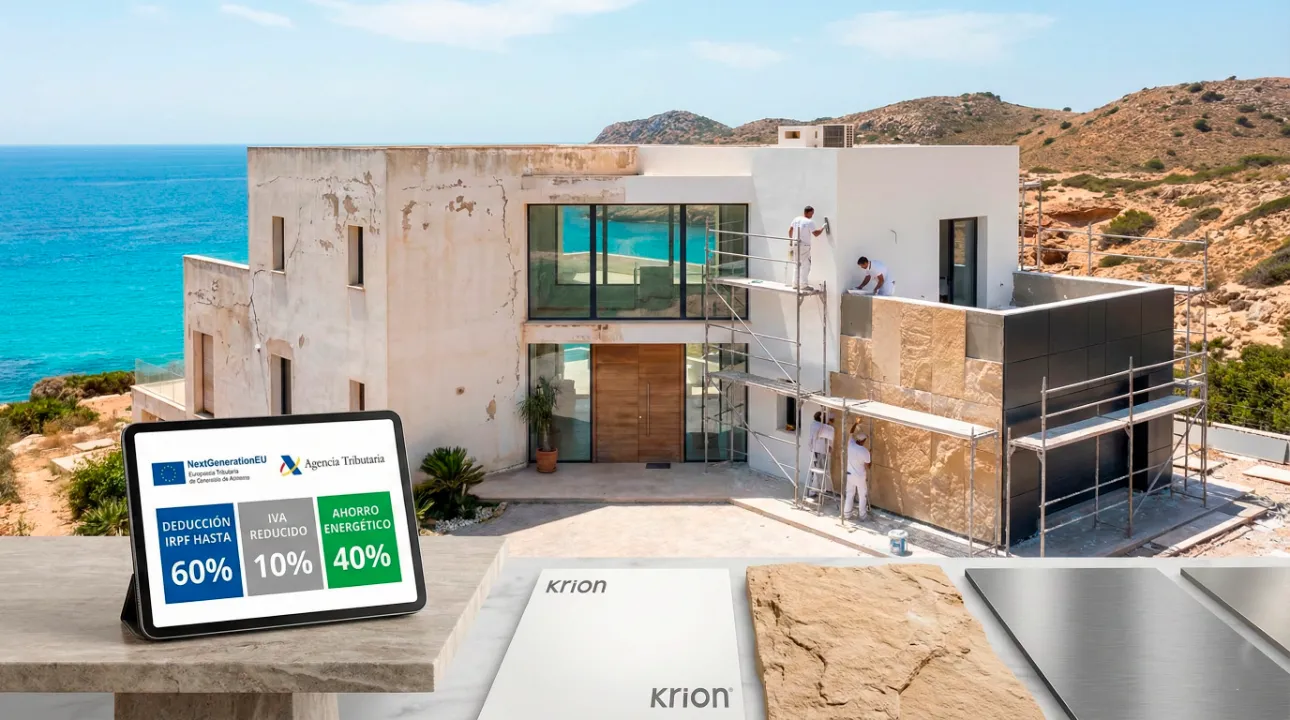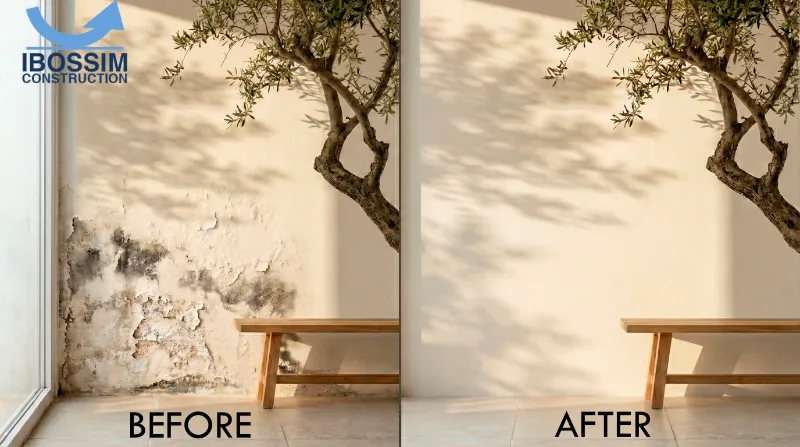Tips for Renovating Your Kitchen
The white minimalism that dominated kitchens for years is giving way to an explosion of earthy colors, innovative textures, and invisible technology. The renovations of 2025 promise multifunctional spaces where sustainability and personalization blend with smart systems that anticipate your needs.
Chromatic and Textural Revolution: Farewell to White Minimalism
| Category | Description |
|---|---|
| Color Palettes | Earth tones, olive green, indigo blues |
| Materials & Finishes | Ultra-glossy Laminam, textured microcement, dyed cork |
| Sustainability | Recycled glass countertops, low-emission porcelain, natural linoleum |
The once-dominant pure white gives way to a burst of personality in 2025 kitchens. Earth tones like terracotta and clay create warm atmospheres that feel connected to nature. Olive green bridges the indoor-outdoor gap, while indigo blues add depth without coldness.
Innovative Materials and Finishes
Touch takes center stage with surfaces that invite interaction. Ultra-glossy Laminam diffuses light softly—ideal for countertops in darker kitchens. In contrast, textured microcement brings a rustic feel without porosity, perfect for prep zones. Dyed cork for cabinetry fronts adds acoustic and thermal warmth, and is surprisingly splash-resistant.

Sustainable Material Choices
Choosing materials isn’t just an aesthetic decision: each one carries an ecological passport. Recycled glass countertops made from ground bottles resemble marble, while low-emission porcelain reduces the carbon footprint by 70% compared to traditional options. For flooring, natural linoleum resurfaces as a biodegradable, antibacterial alternative.
Borderless Spaces: The New Multifunctional Concept
| Aspect | Features |
|---|---|
| Open Kitchens | Sliding acoustic panels, foldable tables, varying ceiling heights |
| Modular Designs | Swappable modules, embedded magnetic outlets |
| Space Optimization | Helical storage, variable-depth drawers, stool niches |
Kitchens in 2025 are chameleons: a morning culinary lab turns into an evening gathering space. The secret lies in systems that transform spaces in seconds—no construction required.
Open Kitchens and Versatile Areas
Walls are replaced by sliding acoustic screens that block sound without breaking visual continuity. Central islands include foldable tables with pneumatic lift mechanisms, extending from 60 cm to 2 meters in just 15 seconds. Varying ceiling heights (20–30 cm) help distinguish areas without physical dividers.
Modular and Multifunctional Designs
Imagine an island that’s a fridge, cooktop, and herb garden all in one. Swappable modules allow you to reorganize based on need—barbecue grill today, vertical hydroponic garden tomorrow. Magnetic outlets embedded in countertops let you relocate power sources on the fly.
Smart Space Solutions for Compact Kitchens
For small spaces, helical storage—180° rotating shelves—triples capacity. Variable-depth drawers adjust automatically to contents, from tall pans to flat containers. Hidden stool niches beneath counters provide extra seating when needed.

Invisible Technology: Intelligence Serving Comfort
| Innovation | Description |
|---|---|
| Appliances | Warming countertops, transparent fridges, 3D scanners |
| Lighting | Circular gestures, Circadian Lighting, directional spotlights |
Smart tech in kitchens is no longer visible—it’s felt. Integrated systems anticipate needs while maintaining visual cleanliness.
Smart and Customizable Lighting
Control lighting with circular gestures on any surface. Circadian Lighting mimics the natural solar cycle, boosting morning productivity with cool whites and fostering evening calm with amber tones. In work zones, directional lights follow your hand movements while chopping or mixing.
How Does Programmable Lighting Enhance Kitchen Experience?
Adaptive lighting cuts cutting and measurement errors by 40%, according to recent studies. When selecting “Baking Mode,” extra intensity highlights specific areas where ingredients will be poured. During dinners, “Host Mode” dims general lights and spotlights bottles and glasses, creating a cocktail bar vibe.
Hyper-Organized Storage: Invisible Order
| System | Function |
|---|---|
| Shelves & Drawers | Weight sensors, refrigerated drawers, spherical racks |
| Fronts | Knuckle-touch opening, magnetized fronts, touch surfaces |
Chaos has no place in kitchens where every centimeter works smartly. These systems categorize, organize, and make everything effortlessly accessible.
Innovative Storage Systems
Weight-sensing shelves alert you when salt or oil runs low. Refrigerated drawers keep herbs three times fresher. Spherical rotating racks give 360° access to jars and cans, even in tight corners.
Handleless Fronts and Seamless Design
Knuckle-touch opening avoids smudges—just tap twice to open. Magnetized fronts allow metallic utensils to stick directly, turning doors into organizers. Some models even feature touch surfaces displaying recipes or grocery lists with a swipe.
How Can Modular Storage Systems Adapt to Changing Needs?
Each module has RFID tracking: place a package of pasta, and the system suggests the best spot based on expiration date and usage. Smart drawer dividers self-adjust when switching from daily dishes to fine china. For big families, interchangeable dividers let a pantry turn into a wine bar in minutes.
Practical Eco-Design: Sustainability Without Sacrifice
| Material | Benefit |
|---|---|
| Algae Bioplastic | Absorbs CO₂ |
| Mineral Wool | Heat resistance |
| Photocatalytic Tiles | Break down stains |
Being eco-conscious no longer means giving up luxury or functionality. New materials and technologies close the gap between performance and environmental respect.
Sustainable Materials and Lifecycle Thinking
Algae-based bioplastics used in cabinet fronts absorb CO₂ during production. Mineral wool countertops offer heat resistance without logging trees. Photocatalytic tiles break down organic stains when exposed to light, reducing the need for harsh cleaners.
Energy-Efficient Equipment
New ultrasonic dishwashers use only 3 liters per cycle and eliminate the need for detergent. Infrared induction ovens reduce cooking times by 25%. Range hoods with heat recovery reuse energy to warm water or assist with cooking.
How Can Energy-Efficient Appliances Reduce Electricity Bills?
A fridge with a magnetic compressor uses the same energy as a 15W LED bulb. Induction cooktops that detect pot size avoid wasting energy by heating air. These innovations can cut monthly kitchen energy costs by up to €60 in average households.
Interior-Exterior Fusion: Kitchens Without Limits
| Element | Function |
|---|---|
| Electrochromic Windows | Adjust light and privacy |
| Pivoting Walls | Turn windows into countertops |
| Climate-Controlled Enclosures | Allow outdoor use year-round |
The outdoors becomes a natural extension of your kitchen thanks to solutions that erase physical and climatic boundaries.
Integrating Indoor and Outdoor Spaces
Electrochromic windows switch from clear to opaque in seconds, regulating light and privacy without curtains. Double-sided pivot walls rotate to turn windows into outdoor counters. Bubble-like climate-controlled enclosures let you use the outdoor space year-round with minimal energy consumption.
Equipped Outdoor Kitchens
Biogas grills powered by household organic waste provide adjustable flames without gas cylinders. Solar self-cleaning sinks use filtered rainwater and UV light for drying. Furniture made from recycled ocean plastic withstands the elements for decades.
Vertical Gardens and Fresh Visuals
Silent aeroponic systems grow lettuce and cherry tomatoes using nutrient-rich mist—no soil, no odors. Decorative hydroponic frames turn windows into edible art. Voice-activated grow assistants notify you when nutrients are low or it’s harvest time.
How Do Vertical Gardens Enhance the Culinary Experience?
Harvesting basil minutes before use multiplies essential oils by 5. Smart gardens suggest recipes based on available herbs: grab parsley, and screens show tabbouleh or green sauce options. Kids involved in gardening develop up to 30% more preference for vegetables, recent pediatric studies show.
Artisanal Personalization: Identity in Every Detail
| Product | Description |
|---|---|
| Resin Countertops | Custom inlays |
| Printed Tiles | Heat- and humidity-resistant family photos |
| Shou Sugi Ban | Unique wood grains through charring |
Mass production makes way for unique pieces that turn kitchens into functional art galleries.
Unique and Personalized Pieces
Resin countertops can contain anything from volcanic ash to shredded musical instruments. Printed tiles with treated family photos resist heat and moisture, forming intimate murals. Shou Sugi Ban wood treatment creates one-of-a-kind grain patterns impossible to replicate.
Digital Craftsmanship and New Technologies
3D food-safe ceramic printers create textured tableware for better grip. Portable laser cutters engrave cutting boards with secret messages only visible during use. DIY kits with vacuum molding let you create cabinet fronts with textures taken from personal objects.
How Can Digital Craftsmanship Democratize Kitchen Customization?
Collaborative design platforms let you upload a child’s drawing and receive a custom-engraved countertop in days for €20/m². Open-source libraries of 3D files for utensils allow printing custom ergonomic spoons for under €1 in materials. Local workshops now offer home holography classes to create 3D glass effects.
To recap, renovating your kitchen in 2025 means designing a living space that evolves with you. Every decision—from tile shade to appliance tech—builds a personalized ecosystem where efficiency, sustainability, and beauty coexist effortlessly. More than following trends, it’s about crafting a space that anticipates your needs while reflecting your truest self.




